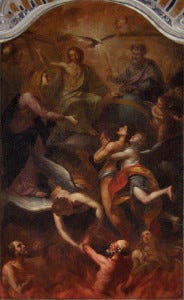Ancient Arguments for the Resurrection

As we reflect on the events of Holy Week, we are reminded that the theme of resurrection has long been a driving force for Christians throughout the history of the church. Just as Christians today seek to provide a defense for the resurrection—from apologists like William Lane Craig (Did Jesus Rise from the Dead?) to surgeons like William Miller (Did Jesus Really Rise from the Dead? A Surgeon-Scientist Examines the Evidence)—so did Christians from the earliest centuries of the church.
Of course, one thinks first of the Gospel writers, who laid out the initial written accounts of Jesus’s resurrection. We can also point especially to Paul, who in 1 Corinthians 15 adduced evidence for Christ’s resurrection from the Scripture and early eyewitnesses, including Cephas (Peter), the twelve, and “five hundred brothers at one time” (1 Cor. 15:6). He highlighted the centrality of the resurrection as the lynchpin of Christianity: “if Christ has not been raised, your faith is futile and you are still in your sins,” for “[i]f in this life only we have hoped in Christ, we are of all people most to be pitied” (1 Cor. 15:17, 19).
But Paul—and all orthodox Christians to follow—believed that “in fact Christ has been raised from the dead” (1 Cor. 15:20). And thus we find a long history of defending both the reasonableness and the reality of the resurrection.
One early Christian in this tradition is Athenagoras, who wrote the second-century De Resurrectione (On the Resurrection), which you can read online at the Christian Classics Ethereal Library. In De Resurrectione, Athenagoras lays out a reasonable argument in defense of the resurrection of the dead, responding to objections and offering positive supporting evidence.
For example, after arguing that the resurrection is not impossible, he goes on to show that God is powerful enough to raise the dead:
[T]hat His power is sufficient for the raising of dead bodies, is shown by the creation of these same bodies. For if, when they did not exist, He made at their first formation the bodies of men, and their original elements, He will, when they are dissolved, in whatever manner that may take place, raise them again with equal ease: for this, too, is equally possible to Him. (Res. 3)
Athenagoras continues:
For that power which could give shape to what is regarded by them as shapeless matter, and adorn it, when destitute of form and order, with many and diverse forms, and gather into one the several portions of the elements, and divide the seed which was one and simple into many, and organize that which was unorganized, and give life to that which had no life,—that same power can reunite what is dissolved, and raise up what is prostrate, and restore the dead to life again, and put the corruptible into a state of incorruption. (Res. 3)
Athenagoras goes on to make several other arguments. One interesting suggestion is that the daily pattern of sleeping and waking offers an analogy for a final death and resurrection. He also notes that humans must be judged for their deeds in this life. Otherwise, they lose all motivation for holy living. In fact, if there is no judgment or resurrection, men “fare worse” than animals and beasts because
they keep in subjection their passions, and concern themselves about piety, and righteousness, and the other virtues; and a life after the manner of brutes would be the best, virtue would be absurd, the threat of judgment a matter for broad laughter, indulgence in every kind of pleasure the highest good, and the common resolve of all these and their one law would be that maxim, so dear to the intemperate and lewd, “Let us eat and drink, for to-morrow we die.” (Res. 19).
Instead, the resurrection assures us that the pursuit of righteousness is worthwhile, that God created humans differently than the beasts because they have a higher purpose. So in the end, Athenagoras appeals to the end for which God created humanity as an argument for the resurrection. He asserts that everything that is created—whether it be something a human (such as an artist) creates or something God creates—“must have an end peculiar to itself” (Res. 24). If that is true, he concludes that
we shall make no mistake in saying, that the final cause of an intelligent life and rational judgment, is to be occupied uninterruptedly with those objects to which the natural reason is chiefly and primarily adapted, and to delight unceasingly in the contemplation of Him who is, and of His decrees. (Res. 25)
Ultimately, while in this world we never fully accomplish what we were designed to do, the resurrection offers us an opportunity to fulfill our purpose—which the Westminster Catechism captures so poignantly—to glorify God and enjoy him forever.
We could pursue multiple avenues for the reasonableness and reality of the resurrection, as Christians have done for centuries. One thing is clear: the resurrection stands as one of the centerpieces of Christianity. As we celebrate the resurrection during this Holy Week, we stand in a long tradition of people who have been persuaded by the evidence and by reason that Jesus did indeed rise from the dead. Therein lies our greatest motivation for a life lived well today and our greatest hope for a better life beyond the grave.
Image: "Cervo066" by Georges Jansoone (JoJan) - Own work (Own photo). Licensed under CC BY 3.0 via Wikimedia Commons - http://commons.wikimedia.org/wiki/File:Cervo066.jpg#/media/File:Cervo066.jpg

